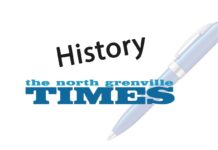Part 2: The coming storm
The political turmoil that gripped Upper Canada in the 1830’s grew out of genuine grievances on the part of residents. The Anglican Church, they believed, had too much power, too much influence in the government, too much land. Reformers wanted to make it illegal for priests and bishops to sit in the Executive or Legislative Councils, which were appointed by the Governor and not answerable to the elected representatives in the Assembly. The Reformers also wanted to change the land granting system, the rule by a few powerful families, and more power and control over the province’s finances to the Assembly.
This region was just as affected by these issues as anywhere else in Upper Canada, but there were specific grievances being debated also. In the 1830’s, all of what is now the United Counties of Leeds & Grenville, along with the townships of Montague, Marlborough and North Gower, were part of the Johnstown District, and the only centre of administration was in Brockville, where the Courts sat and municipal government was located. Given the state, and even absence, of roads, this made it extremely difficult for people in the northern part of the District to gain access to these centres of power.
Public meetings were held throughout the decade to draw up petitions to the Governor, asking for redress. In March of 1832, for example, such a meeting was held in the Court House in Brockville. It broke up in angry division between supporters of the Governor and those seeking change. A petition was drawn up by the latter group, and certain individuals were given the responsibility of getting signatures on the document to be laid before the government. One of those individuals was John Henderson, making his first appearance in the political annals of Upper Canada.
This was some two years before he settled in Kemptville, in business with Baxter Bowman at their warehouse and store on the banks of the South Branch, now part of Curry Park.
The next time we find the mysterious Mr. Henderson is after his arrival, attending yet another protest meeting in his new town. This was a very significant gathering, and had been advertised in the Prescott newspaper in June, 1835. The purpose of the meeting was to draw up yet another petition to be presented to the Parliament, seeking the division of the Johnstown District. It asked that a new District be formed, with Kemptville as its capital. Townships to be included were Edwardsburg and Matilda, Mountain and Osgoode, North and South Gower, Oxford and Marlborough, Montague and Wolford.
The meeting took place in December, 1835, and was attended by many of the families whose names are associated with the region at the time. The venue was Thomas Beckett’s Hotel, which stood on the corner of Clothier and Sanders Streets, where the parking lot is today. Col. Stephen Burritt was Chair, and resolutions were made by W. H. “Squire” Bottom and Milo McCargar. The main resolution, passed unanimously, stated: “That it is expedient and highly necessary, for the convenience and general interests of the people inhabiting the townships of Montague, Wolford, Marlboro, Oxford, North and South Gower, and Edwardsburgh of the Johnstown District – Mountain & Matilda of the Eastern, and Osgoode of the Ottawa District, that the said townships be formed into a separate District, and that Kemptville, in the township of Oxford, be the place selected for the transacting of the public business of the said proposed District.”
Hundreds of signatures had been received on previous petitions to this end, but with no result. A Committee of five was established to draft a Petition to the Legislature: including Squire Bottom, Truman Hurd, and John Henderson.
John Henderson was also one of those entrusted with getting signatures on the petition in Oxford. As usual, nothing came of this, or other petitions passed before 1837.
Henderson was clearly at the forefront of political activism on the Reform side in Oxford-on-Rideau, as he continued to work in partnership with Bowman and make his home in Kemptville. But that all changed, radically and, it seems, quite suddenly, and John Henderson found himself in exile in Ogdensburg by the end of 1837. Kemptville was not to become the capital of a new District, but it was to experience a political upheaval that would remake the town and give a character to its politics that would remain unchanged to this day.
Next: Part 3: Secrets and lies in Kemptville







